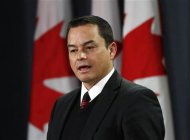Canada national chief re-elected, vows to give voice
TORONTO (Reuters) - The national chief of Canada's First Nations aboriginals was re-elected on Wednesday in a vote of confidence for his non-confrontational approach with the Conservative federal government over its pro-development policies.
Even though critics have said Shawn Atleo's relationship with Prime Minister Stephen Harperis too close, the British Columbia native leader cruised to victory in the third round of voting by chiefs at an assembly in Toronto."All voices must be heard," said Atleo, addressing a conference hall packed with hundreds of chiefs and First Nations members from across Canada. "It's also equally, if not more important, that all voices are understood. Every one of our citizens has a right and responsibility to share in this effort with us."
The national chief heads the Assembly of First Nations, an executive committee of 10 regional chiefs. The advocacy group lobbies the federal government on aboriginal and treaty rights, along with issues like education and resource development.
A record eight candidates, including four women, were on the first ballot on Wednesday, with Atleo winning in the third round with 341 votes, or 67 percent of the vote.
The chief from the Ahousaht First Nation in British Columbia has strong support in his home province, which has the largest number of votes on the national level.
First elected in 2009 after then leader Phil Fontaine stepped down, Atleo was criticized ahead of the vote for his comfortable relationship with the federal government.
CONTENTIOUS PIPELINE
Canada recently changed its policy to speed up environmental reviews of major energy, mining and pipeline projects. Some fear the new review process will result in less consultation with First Nations people, who claim ownership to much of the land where resource projects are located.
One of the most contentious issues is Enbridge Inc's Northern Gateway pipeline, which would connect Alberta's tar sands to Kitimat, British Columbia, where it would be loaded onto tankers and shipped to markets in Asia and the United States.
Atleo has not made clear his stance on the controversial pipeline and some chiefs were eager for a national leader willing to take a more confrontational approach with the federal government to ensure their voices were heard.
"We're not opposing to any development, but we want that development done with us at the table and certainly it should be done at our own pace," said Alfonz Nitsiza, chief of the Tlicho Government in the Northwest Territories. "These massive developments will create a lot of issues environmentally and will have social impact on our First Nation people."
But Atleo's supporters said that he was making good progress in getting more recognition for aboriginal rights simply because of his ability to work closely with the federal government.
"I think you need to have a close relationship to get the respect that all aboriginals deserve and have earned and that's the only way we're going to move forward," said Ron Giesbrecht, chief of Kwikwetlem First Nation in British Columbia.
In second place throughout the three rounds of voting was Pamela Palmater, a Toronto-based Mi'kmaq lawyer and academic who had vowed to take a stronger line with the ruling Conservatives on policy decisions.
As candidates failed to reach the minimum 15 vote threshold, criticism mounted over the system, whereby the national chief is decided by 633 chiefs-in-assembly who are meant to represent First Nations bands across Canada.
Some argue that all First Nations people should be allowed to vote directly, a move that they say would give the organization more authority with its people and the Canadian government. Others are seeking weighted votes for chiefs based on the number of treaty Indians they represent.
First Nations people, who make up around 1.2 million of Canada's 34.5 million population, suffer high levels of poverty and crime. Unemployment and suicide levels are highest among aboriginals, especially on the remote reserves and settlements that dot the country's north.
(Reporting by Julie Gordon, Editing by Frank McGurty and Jackie Frank)
Canada national chief re-elected, vows to give voice
![Canada national chief re-elected, vows to give voice]() Reviewed by TA
on
19:30
Rating:
Reviewed by TA
on
19:30
Rating:


Aucun commentaire: